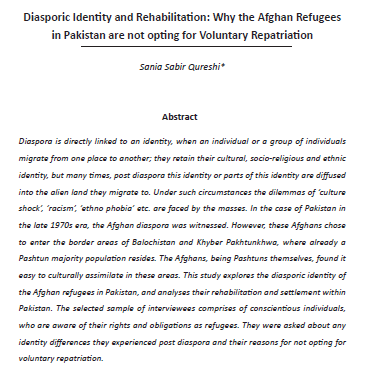Diasporic Identity and Rehabilitation: Why the Afghan Refugees in Pakistan are not opting for Voluntary Repatriation
Abstract
Diaspora is directly linked to an identity, when an individual or a group of individuals migrate from one place to another; they retain their cultural, socio-religious and ethnic identity, but many times, post diaspora this identity or parts of this identity are diffused into the alien land they migrate to. Under such circumstances the dilemmas of ‘culture shock’, ‘racism’, ’ethno phobia’ etc. are faced by the masses. In the case of Pakistan in the late 1970s era, the Afghan diaspora was witnessed. However, these Afghans chose to enter the border areas of Balochistan and Khyber Pakhtunkhwa, where already a Pashtun majority population resides. The Afghans, being Pashtuns themselves, found it easy to culturally assimilate in these areas. This study explores the diasporic identity of the Afghan refugees in Pakistan, and analyses their rehabilitation and settlement within Pakistan. The selected sample of interviewees comprises of conscientious individuals, who are aware of their rights and obligations as refugees. They were asked about any identity differences they experienced post diaspora and their reasons for not opting for voluntary repatriation.

Stratagem by Centre for Strategic and Contemporary Research is licensed under a Creative Commons Attribution 4.0 International License.



